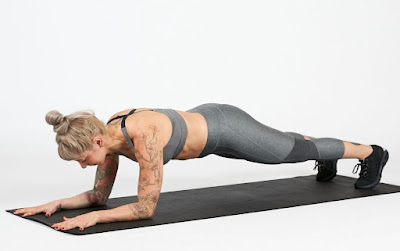Exercises that are intended to increase the strength of particular muscles or muscle groups are known as strengthening exercises. Exercises that build muscle strain the muscle to the point of tiredness. A muscle is encouraged to expand by the stress and overload, which boosts its strength. Weak muscles might make it more likely that nearby joints and soft tissues will be hurt. The Doctors will evaluate, diagnose, and give you a strengthening training regimen that is right for you.
So, Want to eat less, exercise more, and burn calories more
effectively? Reduce your body fat. Rescue through strength training!
Everyone's total health and fitness depend on strength training. If you
don't do anything to replenish the lean muscle you lose over time, your body
fat percentage will rise over time. At any age, strength exercise can
help you maintain and improve your muscular strength & mass.
Strengthening
Exercise helps you
- Build sturdy bones: Strength exercise can promote bone density and lower the risk of osteoporosis by placing stress on your bones.
- Take care of your weight: Strength training can aid in weight management or loss, it also used as a weight loss medicine in Pakistan and it helps speed your metabolism so that you can burn more calories.
- Improve the quality of your life: Strength training may increase your ability to do daily tasks and your quality of life. Additionally, strength training can shield your joints from harm. Gaining muscle can help improve balance and possibly lower your chance of falling. You'll be able to age independently if you do this.
- Organize chronic illnesses: Numerous chronic illnesses, including arthritis, back pain, obesity, heart disease, depression, and diabetes, might have their signs and symptoms lessened by strength training.
- Develop your capacity for thought: According to some research, older individuals' thinking and learning abilities may be enhanced by frequent strength training and aerobic activity.
Strengthening
Exercise Possibilities
Home & Gym both places you can pick for this exercise.
- Self-workout: Numerous workouts can be performed with little to no equipment. Try lunges, squats, lunges, planks, pushups, and pull-ups.
- Tube for resistance: Cheap, thin tubes called resistance tubing offer resistance when stretched. Resistance tubes come in a wide variety of forms, and you can buy them online or at almost any sports goods retailer.
- Common weight: Dumbbells and barbells are common equipment for strength training. Soup cans can be used as weights if you don't have any at home. Kettle bells and medicine balls are two additional alternatives.
- Weighting equipment: Most gyms have a variety of resistance devices. You can also spend money on workout home gym equipment.
- Training with cable suspension: Another possibility to explore is cable suspension training. While performing body weight exercises like pushups or planks, you suspend a portion of your body, such as your legs, during cable suspension training.
Also, Read this Things You Must Need to Know About Cardio
Ready for Strength training
Before starting a strength training or aerobic fitness
program, consult your doctor if you have a chronic ailment, are older than 40,
or haven't been active lately. Consider warming up with vigorous jogging or
another aerobic activity for five to ten minutes before starting weight
training. Warm muscles are less likely to be injured than cold ones. Select a
weight or resistance level that will cause your muscles to become fatigued
after 12 to 15 repetitions. Increase the weight or resistance progressively
until you can perform an exercise with more repetitions without difficulty.
According to research, most people can efficiently gain
muscle with one set of 12 to 15 repetitions using the right weight, which is
equivalent to three sets of the same exercise. You are using the muscle enough
to make it stronger as long as you use it until it becomes fatigued, which
means you can no longer raise it for another repetition. Additionally, if you
become fatigued at a higher repetition count, you are probably utilizing a
smaller weight, which will make it simpler for you to regulate and maintain
proper technique.
Give your muscles a full day of rest in between each
exercise session to allow for muscle recovery. Also, pay attention to your
body's signals. Stop performing a strength-training exercise if it hurts. Think
about attempting it at a lighter weight or again in a few days.
To prevent injuries when strength training, it's crucial to
employ the right technique. Work with a trainer or other fitness professional
to learn the proper form and technique if you are new to strength training. As
you strength train, don't forget to breathe.
Strengthening
Exercise Programs
The exercises in strengthening exercise programs will cover
a range of muscle groups and/or individual muscles. These workouts will start
off easier and get harder as your strength increases. The following may be
included in some of the exercises:
- Working out against gravity
- Working out against water's resistance
- Working out with a resistance band
- Workouts involving weights
- Exercise where the burden is your own body weight
Exercises for muscular strengthening won't work unless the
muscle is overworked. These exercises will be useful for the aim you're trying
to accomplish; for instance, a squat would be a useful exercise if your goal
was to be able to bend over and pick something up off the floor. This is
because exercises that serve no purpose decrease compliance.
Also, Read this All You Need To Know About Fitness Types,
Tips, Plans & Goals
When to anticipate
outcomes
Strength training doesn't require you to lift weights for
hours on end to reap its rewards. With just two or three 20- or 30-minute
strength training sessions each week, your strength can develop significantly.
The Department of Health and Human Services suggests the
following exercise recommendations for the majority of healthy adults:
- Aerobic exercise: Get 75 minutes of severe aerobic exercise at home or anywhere, 150 minutes of moderate aerobic exercise, or a combination of the two per week. The instructions advise spreading out this activity over the course of a week. Even more activity will have a positive impact on your health. But even a little bit of exercise is beneficial. Short bursts of activity spread throughout the day might add up to positive health effects.
- Strength training: At least twice a week, perform strength-training activities for all the major muscle groups. Each exercise should be performed once with a weight or resistance level that causes your muscles to become fatigued after 12 to 15 repetitions.
You might experience a gradual increase in strength as you
add strength training routines to your fitness regimen. You'll probably be able
to lift weights for longer lengths of time as your muscle mass grows. Even
though you start out out of shape, if you keep it up, you can continue to build
strength.
What are the
benefits of Strengthening Exercises?
The advantages of strengthening workouts are numerous and
varied. Receiving a strengthening exercise program has some advantages,
including:
- Muscle power is increased
- Reduce energy use because muscles are more effective.
- Decreased danger of harm
- Improve function
- Improve quality of movement
- Postpone the start of arthritic problems
The numerous physiotherapists and personal trainers
will provide a thorough evaluation and strengthening workout program. You can
gain from strengthening workout plans & program in a variety of ways. Your trust in the
muscle will grow as a result of being able to rely on it.
Strength-training
exercises for beginners
These exercises are perfect for beginners since they
increase your strength and provide you a chance to practice the fundamental
movements that hundreds of other exercises are built on. All of them are
regarded as functional exercises, which mean that they enable you to build
strength through activities you carry out outside of the gym. Better
proficiency and strength gains later on can be attained by mastering these
techniques first and developing a rock-solid foundation of strength and good
form.
- Squat
- Push-ups
- Deadlift
- Hollow body hold
- Glute Bridge
- Reverse lunge
- Dumbbell chopper
- Bent over row












No comments:
Post a Comment